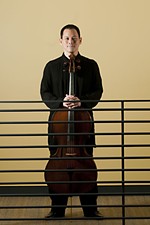Wondrous Journey
At Conspirare's concert Wondrous Journey, the sheer pleasure that this choral ensemble's members take in singing shone through even more resplendently than usual
Reviewed by Robert Faires, Fri., March 3, 2006

Wondrous Journey
University Presbyterian Church, Feb. 24
In Shakespeare's Twelfth Night, the clown Feste sings a ballad for Illyria's duke, who gives him money for his "pains." "No pains, sir," the jester quips. "I take pleasure in singing." So do the members of Conspirare, a fact splendidly in evidence throughout the choral ensemble's concert Wondrous Journey. Artistic director Craig Hella Johnson composed a program in which many pieces spoke openly to the glories of song, allowing the elation, the gratification, the sheer joy that Conspirare's artists take in singing to shine through even more resplendently than usual.
At first, it did so with a sense of the sacred, opening with a plainchant, the even, medieval tones establishing an atmosphere hushed and holy, contemplative and tranquil, like a prayer offered in the quiet of dawn before the world wakes. In their treatment of Rabindranath Tagore's text, which told how songs "showed me secret paths" and "guided me … to the mysteries of the country of pleasure and pain," the singers projected an almost mystical reverence for their art. That gave way to the brighter, more spirited "Alleluia Sing a New Song" of Jakob Handel, but the progression felt as natural as day following dawn. Here, song, this wondrous means of expression, became the ideal form for praising the wonders of creation and its creator, prompting a morning exaltation, with voices swooping in and around one another like swallows in flight. This led into Johannes Brahms' "Schaffe in mir Gott" ("Create in Me, O God"), which didn't explicitly address song but did build on the sense of song connecting to the deity, its voices gathering, gathering, gathering force and volume into a plea of such passion that it could not have helped but turn the hearts at heaven's gates. The program peaked in this vein with Benjamin Britten's "Hymn to St. Cecilia," an epic celebration of music, alternately lyrical and whimsical, dark and light, set to words by W.H. Auden that flash with startling images of beauty and sorrow and mystery. Listening to Conspirare's performance was like rolling on a great sea, its majesty and depth inspiring awe.
By contrast, other numbers spoke of song more in terms of the world, as an outgrowth of nature or human need. In singing Jules Massenet's Chansons des bois d'Amaranthe, the company voices glided through images of pastoral springtime like a breeze over a meadow. In "This Is My Song," the men took the familiar tune of Sibelius' Finlandia to exquisite heights, their robust, impassioned call "O hear my song" communicating more than just a desire to sing but a need to sing, to let one's spirit soar free through voice and melody.
Not every piece focused on singing. Certainly not Veljo Tormis' Curse Upon Iron – a rambling, rumbling rant against the metal from which man has forged so many weapons, so much misery. Anchored by soloists Tracy Shirk and Glenn Miller and the pounding percussion of Thad Anderson, the choir whispered, wailed, and grumbled in the Estonian composer's native tongue – making it seem even more like a secret spell cast by a diabolical cabal. Then there was Paul Crabtree's Five Romantic Miniatures (from The Simpsons), with lyrics drawn from lines spoken by Homer (and Lisa), including the immortal "Marge, you make the best pork chops. Mmmmm, pork chops." While it may sound like a throwaway, the piece was surprisingly inventive and heartfelt, at times so tender that it felt like a vocal caress.
Still, what lingers from Wondrous Journey are the repeated outpourings of feeling for song, the testament to its power and splendor. For this listener, the simplest and most affecting of these came when the new Conspirare Children's Choir joined the adult company for the Sesame Street standard "Sing." Joe Raposo's lyrics might strike some as sappy, but delivered by these young voices, so pure, so honest, they carried the ring of wisdom. The 50 young vocalists showed admirable focus – tribute to director Nina Revering – and when they united with the three dozen adults, the sound was sublime, generations joined in a shared love of music, with no instruments beyond the one they carry every day of their lives. Voices joined just to sing, sing a song. Wondrous, indeed.










